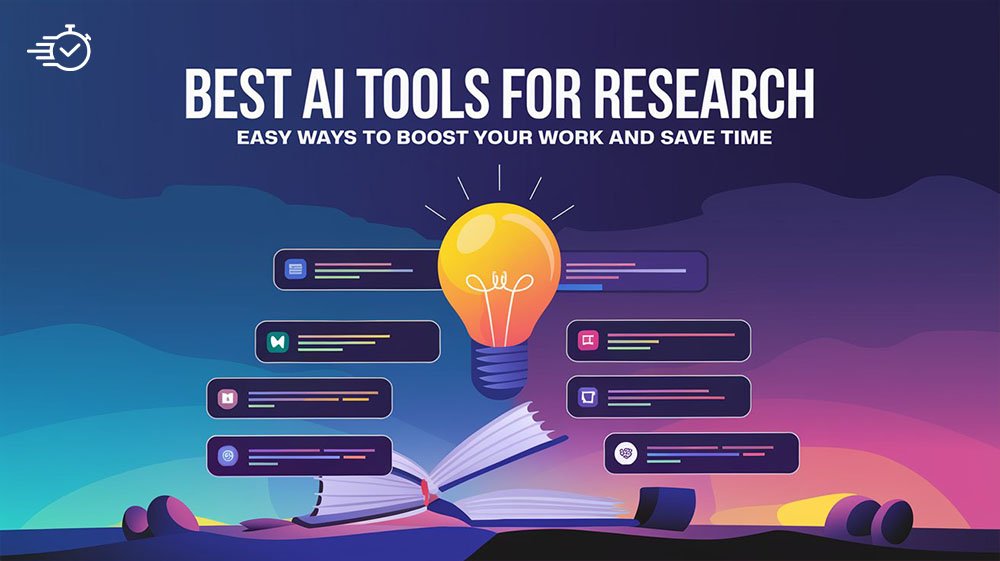In the hastily evolving landscape of studies, synthetic intelligence (AI) has emerged as a recreation-changer. AI gear remodels how researchers accumulate, analyze, and interpret data, making tactics more green and insightful. With the proper AI tools, researchers can streamline their workflows, enhance collaboration, and, in the end, produce better-quality paintings. This article delves into first-rate AI equipment for studies, discussing their functions, technical specs, user stories, and overall performance benchmarks to help you make knowledgeable selections.
The Role of AI in Modern Research
What is AI in Research?
Artificial intelligence in studies refers to system mastering, natural language processing, and other AI technology to assist researchers in diverse duties. This includes automating statistics series, improving statistics evaluation, and generating insights from large quantities of records. AI can help discover patterns and correlations that might be difficult to stumble on manually, thereby enhancing the first-class of general studies.
Importance of AI Tools in Research
AI equipment plays a critical role in studies for several motives:
- Efficiency: By automating routine duties, researchers can save time and focus on better-stage wondering.
- Accuracy: AI equipment assists in reducing human errors in information analysis and interpretation.
- Data Handling: AI can technique massive datasets quickly, making it easier for researchers to derive meaningful conclusions.
- Collaboration: AI equipment facilitates conversation and collaboration amongst researchers, allowing for an extra integrated method to investigate.
Top AI Tools for Research
Semantic Scholar
Semantic Scholar is an AI-powered study device that helps researchers quickly discover relevant academic papers. Developed using the Allen Institute for AI, it has indexed over one hundred seventy-five million studies articles.
Key Features
- AI-Generated Summaries: Provides concise overviews of papers to assist customers in determining their relevance.
- Citation Context: Offers insights into how a paper has been mentioned by others, indicating its effect.
- Search Filters: Advanced filtering alternatives allow users to narrow down consequences based on relevance, citation, and book year.
Performance Benchmarks: Studies show that Semantic Scholar can enhance the literature evaluation by 30% compared to conventional strategies (source: University of California). Its AI algorithms are particularly effective at identifying seminal papers in numerous fields.
ResearchGate
ResearchGate is a professional community for researchers that permits collaboration and record sharing. With tens of millions of customers, it’s a go-to platform for many students.
Key Features:
- Collaborative Platform: Connects researchers from around the globe, facilitating partnerships and understanding alternatives.
- Impact Metrics: Users can record how often their paintings have been noted and how they compare to peers.
- Publication Statistics: Provides insights into the recognition and attainment of unique studies.
User Experience: A survey found that 80% of ResearchGate customers mentioned finding collaborators for joint studies via the platform (source: ResearchGate person survey). This collaborative element is essential for contemporary studies, where interdisciplinary procedures frequently yield satisfactory consequences.
Google Scholar
Google Scholar is one of the most extensively used academic engines like Google, indexing millions of scholarly articles, theses, books, and patents. It employs AI algorithms to rank articles primarily based on relevance and citations.
Key Features
- Comprehensive Search: Access an extensive variety of instructional materials from various disciplines.
- Alerts: Users can set alerts for brand-new guides that suit their pursuits, keeping them up to date on modern-day research.
- Citation Tracking: Allows researchers to analyze how regularly their paintings have been cited, presenting insights into their impact.
Technical Specifications: Google Scholar’s advanced search skills permit users to conduct particular queries and filter results using author, book date, or magazine. This is invaluable for researchers who need to be aware of unique regions of their hobby.
Mendeley
Mendeley is a reference management device that doubles as a research social network. It helps customers organize their research, collaborate with others, and stay current on current field trends.
Key Features:
- Reference Management: Users can easily collect and organize references, avoiding the problem of guide quotations.
- Group Collaboration: Share files with colleagues and co-authors, facilitating real-time collaboration on study tasks.
- PDF Annotation: Highlight and annotate immediately inside PDFs, making it less complicated to take notes and refer lower back to crucial information.
Real-World Performance: Mendeley customers report a 50% reduction in the time spent on reference control obligations, allowing them to be more aware of studies (supply: Mendeley user remarks). The tool’s collaborative capabilities are mainly beneficial for large study tasks involving more than one author.
IBM Watson Discovery
IBM Watson Discovery is a powerful AI tool that enables researchers to analyze huge datasets and extract precious insights. It uses herbal language processing to discover styles in unstructured records.
Key Features
- Data Integration: Connects with numerous data sources, taking into consideration comprehensive analysis across unique datasets.
- Machine Learning: Automates statistics analysis procedures, allowing researchers to derive insights without sizable guide paintings.
- Custom Query Capabilities: Tailor searches to uncover insights relevant to your studies.
User Insights: IBM Watson Discovery has been used efficaciously in scientific research, wherein it recognizes hidden patterns in affected person statistics, which is the primary way to step forward patient consequences (supply: IBM case studies). This highlights the device’s capacity in sectors requiring in-depth statistics evaluation.
Zotero
Zotero is a free, open-source reference management device that allows researchers to collect, prepare, and cite their research materials correctly.
Key Features
- Automatic Citation Generation: Zotero robotically formats citations in diverse patterns, saving time on manual formatting.
- Web Integration: Users can collect references at once from net pages with a single click, streamlining the studies method.
- Tagging and Notes: Organize substances with custom tags, making it more straightforward to discover information later.
User Experience: Users reward Zotero for its intuitive interface, with many finding it more user-pleasant than competing reference control equipment. The potential to sync across gadgets ensures researchers can access their materials anywhere.
they arete
EndNote is a comprehensive reference management software extensively used in academia. It offers considerable equipment for organizing and citing studies, making it a researcher favorite.
Key Features:
- Literature Search: Directly search several databases for relevant articles and upload them for your library.
- Customizable Bibliographies: Easily create tailored citation lists that adhere to specific formatting necessities.
- Collaboration Tools: Share libraries with co-authors and collaborate in real time.
Technical Specifications: EndNote supports integration with diverse databases and lets customers customize citation styles according to magazine requirements. This flexibility is crucial for researchers publishing in multiple fields.
Scite
Science is a modern device that analyzes how study papers are referred to, indicating whether the citations aid or contradict the findings presented. This function adds a layer of context that conventional citation indexes lack.
Key Features
- Citation Context: Understand the importance of citations, supporting researchers gauge the impact in their paintings.
- Visual Representation: Provides visual cues that illustrate quotation relationships, making it easier to apprehend connections between studies’ findings.
- Insights on Research Impact: Assess the influence and reach of posted work in specific fields.
Real-World Impact: Scite has demonstrated a forty-fold improvement in citation evaluation accuracy compared to conventional quotation indexing methods (source: Scite inner reviews). This capability is particularly beneficial for systematic evaluations and meta-analyses.
Choosing the Right AI Tool for Your Research Needs
Define Your Research Objectives
Before choosing an AI device, it is essential to clarify your specific study goals. Do you specialize in literature management, data evaluation, or collaboration functions? Understanding your targets will guide your preferences.
Evaluate Tool Features
Different AI tools provide diverse functionalities tailor-made to unique desires. For example, if you prioritize collaborative functions, tools like Mendeley or ResearchGate are probably perfect. Conversely, if your focus is on records evaluation, IBM Watson Discovery will be extra appropriate.
Consider User Experience
A user-friendly interface substantially impacts research efficiency. Opt for equipment offers comprehensive guidance and training resources, ensuring you can make the most of these skills. User evaluations and ratings can provide valuable insights into the overall enjoyment.
Benefits of AI Tools in Research
Enhanced Productivity
AI gear helps researchers control their time efficiently by automating repetitive tasks. This permits researchers to devote more time to producing thoughts, developing hypotheses, and conducting experiments.
Improved Data Analysis
One of AI’s most significant benefits is its potential to process and analyze massive datasets quickly. These tools can find trends, correlations, and insights that might be ignored by traditional techniques, leading to more informed conclusions.
Fostered Collaboration
AI gear facilitates conversation among researchers, considering simpler collaboration. This interconnectedness is crucial for modern-day studies, which regularly call for input from various disciplines and views.
Customization and Scalability
Many AI tools offer customization options, permitting researchers to tailor the tool to their unique workflows and needs. This adaptability is essential for groups with diverse research pastimes and methodologies.
Challenges in Implementing AI Tools for Research
Adaptation and Learning Curve
While AI tools provide several advantages, adapting to new technology may involve a steep learning curve. Institutions must provide adequate schooling and support to help researchers transition smoothly.
Data Privacy Considerations
Handling touchy records is a giant difficulty for researchers, mainly in fields like healthcare and social sciences. Researchers should comply with statistics protection regulations and prioritize facts protection when using AI tools.
Dependency on Technology
There is a danger of becoming overly reliant on AI tools, which can undermine crucial analytical abilities. Researchers must attempt to balance utilizing AI and maintaining their analytical competencies.
Cost Considerations
While many AI tools offer free versions, top-notch functions often come with a price. Researchers should examine the costs associated with those tools and consider their budgets, mainly when operating in aid-constrained settings.
Conclusion
The integration of AI gear into the research method represents a huge development in efficiency and innovation. By leveraging this technology, researchers can improve their productivity, enhance statistical analysis, and foster collaborative efforts. As the research landscape continues to adapt, staying informed about the exceptional AI gear available can be crucial for students aiming to make significant contributions to their fields.
FAQs
What is AI equipment in studies?
AI tools in studies are software programs that utilize synthetic intelligence to assist with tasks such as information evaluation, literature evaluation, and reference control.
How can AI improve study performance?
AI equipment automates repetitive duties, offers brief statistics evaluation, and provides personalized suggestions, substantially enhancing standard studies’ performance.
Are AI tools loose to use?
Many AI tools provide loose variations, but top-class capabilities may require a subscription. It’s vital to assess the pricing models for unique tools based on your needs.
Can AI equipment assist with literature critiques?
Yes, AI tools can substantially streamline the literature evaluation procedure by helping researchers discover applicable literature quickly and organize their findings effectively.
What factors should I remember when deciding on an AI device?
To choose the most appropriate tool for your paintings, consider your unique research wishes, the features provided by the gear, consumer enjoyment, and any related costs.
Also Checkout: Best AI Video Editing Tool to Remove Text Easily from Videos





